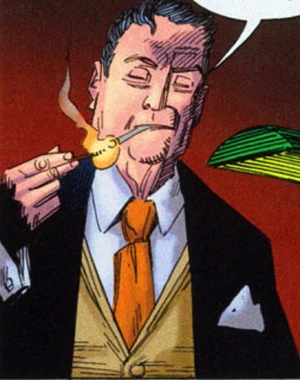
Robert Cherry in 1958
| “ | Jimmy, you can call me M. Behind my back, you can even call me Mother. But Harry... Harry died a long time ago, in the sewers of Vienna. Let's leave it like that, shall we?
- Harry Lime |
” |
Robert Kim Cherry, also known as Harry Lime, is M of the 1950s. He was formerly the head of Security in the Ministry of Love during the Big Brother era, and was responsible for conspiring the death of Harold Wharton.
History[]
Greyfriars[]
A student of the Greyfriars School, Robert Cherry was a friend of Harold Wharton, Billy Bunter and Gerry O'Brien. He was noted for being both cheerful and dangerous at the same time. He was also known for always pesking Billy Bunter for any wrongs the latter committed. At Greyfriars Cherry came up with the code name Harry Lime, which would come to be his main alias.
The Third Man[]
Following the Second World War, Lime served in Allied-occupied Vienna. With antibiotics being new and scarce outside military hospitals and commanding a very high price, he began stealing penicillin from military hospitals and selling it on the black market diluted, leaving many patients to die.
This covert operation was eventually exposed, leading Harry to fake his death by killing his orderly and cohort, Joseph Harbin, in his stead during a motor accident. The police believed him to be dead until the American pulp Western writer and his former childhood friend, Holly Martins, uncovered his deception. This led to him fleeing to the sewers beneath the city where he was presumably shot to death. But it proved to be yet another deception.
Service of the Empire[]
Harry Lime, Wharton and O'Brien all became key influences of the Ingsoc Party which was able to gain control of Parliament in 1945. Wharton, the leader, became the dictator Big Brother, who destroyed nearly all free will and civil rights. Lime became the head of Security in the Ministry of Love.
Eventually, however, Lime along with O'Brien plotted a coup against Wharton, leading to the death and overhaul of Big Brother. O'Brien would become the new Prime Minister, who tried desperately to remain in control by re-dubbing Ingsoc "New Ingsoc" before finally consenting to the Conservative Party and allowing to steadily revert the strict policies established by the Big Brother regime. It was heavily implied that Lime and MI5 had played in orchestrating O'Brien's downfall by releasing incriminating documents to the Conservatives, in which Lime, in response to O'Brien's suspicions, insisted that he was entirely innocent during his colleague's predicament.
Lime had since remained in power in 1958, and in the same year discovers that the file on the history of the League of Extraordinary Gentlemen has been stolen. Lime was annoyed at Jimmy Bond's incompetence in letting it be stolen and orders him to retrieve it along with Hugo Drummond and Emma Night. However, their mission ended in failure as the Black Dossier was spirited away to the Blazing World and Drummond was secretly murdered by Bond.
Victory Vanguard[]
By 1964, Lime became the architect behind the British government-sponsored superhero team, the Victory Vanguard, to counter the United Nations-sponsored Seven Stars. Even though Lime held a contemptuous view of costumed adventurers, he begrudgingly saw the Vanguard as a necessary tool for Britain to catch-up and compete with other emerging superpowered groups such as the Seven Stars. However, Lime was left very unsatisfied with the Vanguard for lacking "first-rate" superhumans (Ace Hart was an exception, and Lime derided Tommy Walls' ice cream-based powers) and propaganda value.
Source material[]
Harry Lime was a character in the novel The Third Man by Graham Greene. The novel was adapted into a film in which Orson Welles appeared as the character. Robert Kim Cherry is a character from the Greyfriars stories.
Robert's middle name 'Kim' is taken from the famed spy Kimball O'Hara, who was the protagonist of Rudyard Kipling's novel Kim. His name is also a reference to the real-life spy Kim Philby, a friend of Graham Greene, author of The Third Man. Philby was himself referred to as the "Third Man" in 1955 when it was claimed that he was a Soviet spy working with Donald Maclean and Guy Burgess who had recently defected to Soviet Russia.
Lime's appearence resembles that of actor Michael Caine, perhaps referring to working-class anti-hero Harry Palmer of Len Deighton's novels.
Harry Lime's unpleasant attitude toward "startling and deplorable... mystery men" and costumed vigilantes reflects Alan Moore's then-views on superhero comics.
